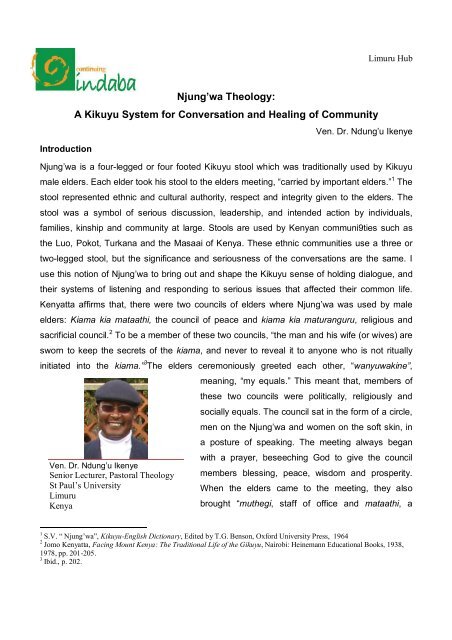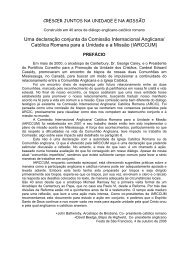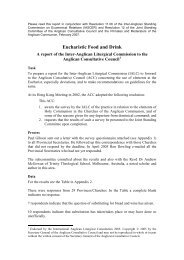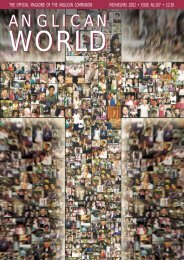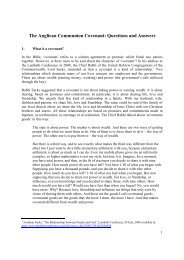Njung'wa Theology: A Kikuyu System for ... - Anglican Communion
Njung'wa Theology: A Kikuyu System for ... - Anglican Communion
Njung'wa Theology: A Kikuyu System for ... - Anglican Communion
Create successful ePaper yourself
Turn your PDF publications into a flip-book with our unique Google optimized e-Paper software.
Introduction<br />
Njung’wa <strong>Theology</strong>:<br />
A <strong>Kikuyu</strong> <strong>System</strong> <strong>for</strong> Conversation and Healing of Community<br />
Limuru Hub<br />
Ven. Dr. Ndung’u Ikenye<br />
Njung’wa is a four-legged or four footed <strong>Kikuyu</strong> stool which was traditionally used by <strong>Kikuyu</strong><br />
male elders. Each elder took his stool to the elders meeting, “carried by important elders.” 1 The<br />
stool represented ethnic and cultural authority, respect and integrity given to the elders. The<br />
stool was a symbol of serious discussion, leadership, and intended action by individuals,<br />
families, kinship and community at large. Stools are used by Kenyan communi9ties such as<br />
the Luo, Pokot, Turkana and the Masaai of Kenya. These ethnic communities use a three or<br />
two-legged stool, but the significance and seriousness of the conversations are the same. I<br />
use this notion of Njung’wa to bring out and shape the <strong>Kikuyu</strong> sense of holding dialogue, and<br />
their systems of listening and responding to serious issues that affected their common life.<br />
Kenyatta affirms that, there were two councils of elders where Njung’wa was used by male<br />
elders: Kiama kia mataathi, the council of peace and kiama kia maturanguru, religious and<br />
sacrificial council. 2 To be a member of these two councils, “the man and his wife (or wives) are<br />
sworn to keep the secrets of the kiama, and never to reveal it to anyone who is not ritually<br />
initiated into the kiama.” 3 The elders ceremoniously greeted each other, “wanyuwakine”,<br />
Ven. Dr. Ndung’u Ikenye<br />
Senior Lecturer, Pastoral <strong>Theology</strong><br />
St Paul’s University<br />
Limuru<br />
Kenya<br />
meaning, “my equals.” This meant that, members of<br />
these two councils were politically, religiously and<br />
socially equals. The council sat in the <strong>for</strong>m of a circle,<br />
men on the Njung’wa and women on the soft skin, in<br />
a posture of speaking. The meeting always began<br />
with a prayer, beseeching God to give the council<br />
members blessing, peace, wisdom and prosperity.<br />
When the elders came to the meeting, they also<br />
brought “muthegi, staff of office and mataathi, a<br />
1 S.V. “ Njung’wa”, <strong>Kikuyu</strong>-English Dictionary, Edited by T.G. Benson, Ox<strong>for</strong>d University Press, 1964<br />
2 Jomo Kenyatta, Facing Mount Kenya: The Traditional Life of the Gikuyu, Nairobi: Heinemann Educational Books, 1938,<br />
1978, pp. 201-205.<br />
3 Ibid., p. 202.
www.anglicancommunion.org/ministry/continuingindaba<br />
Page 2 of 6<br />
bunch of sacred leaves.” 4 Both male and female in the Kiama kia Mataathi as elders had the<br />
responsibility of carrying these two symbols of peace, to remind them of the duty of peace-<br />
maker in the community. The members also pledged to be calm and peaceful deliberations <strong>for</strong><br />
the prosperity of the people. They were expected to be guided by reason and wisdom in all<br />
deliberations.<br />
Basic Ingredients to the <strong>System</strong> of Conversation among the Agikuyu<br />
First, speakers, both male and female had authority, given by the community. To be an elder<br />
among the <strong>Kikuyu</strong>, “muthuri wa kiama”, meant that you have given several goats to the council<br />
of elders and that you have been qualified by the council. You must also have demonstrated<br />
that you are good at listening carefully and that; you care <strong>for</strong> the well-being of the community.<br />
You must be a Mumenyi, meaning that you are well-in<strong>for</strong>med, knowledgeable, skilled and an<br />
expert in sorting things out. 5 This quality of understanding, intelligence, intellect, and ability to<br />
know was required <strong>for</strong> all persons who sat on the stool. The women sat on a soft skin,<br />
mutumia ngatha, when in the council. They also had to have the same qualities as the men to<br />
participate.<br />
You must also be a Mumenyereri, meaning, you must a guardian of the community. 6 This<br />
quality or act was geared toward taking care <strong>for</strong> the welfare of all participants and those<br />
involved in the issues at hand. Guardianship was bestowed upon the elders, male and female,<br />
as persons who were going to be not only skillful, but also careful, thrift and watchful.<br />
Second, the rules of engagement were called ndeto cia ndereti, meaning that, they engaged in<br />
conversation, discussion; <strong>for</strong> the affairs, matters, and utterances of significance. 7 They<br />
exchanged views with the goal of reaching a consensous or a common understanding.<br />
Third, the purpose of voice in the dialogue was <strong>for</strong> a communal good. Men and women who<br />
participated in the dialogue had an equal voice, “as long as they transcended individual<br />
agendas and reflected upon action within the reality of their historical narratives and extended<br />
kinship relations.” 8<br />
4 Ibid., 203.<br />
5 S.V.<strong>Kikuyu</strong>-English Dictionary, “ Mumenyi.”<br />
6 S.V. “ Mumenyereri.”<br />
7 S.V. “Ndereti.” ; “Ndeto.”<br />
8 Ndung’u J.B. Ikenye, Decolonization of the Soul, p. 6.
www.anglicancommunion.org/ministry/continuingindaba<br />
Page 3 of 6<br />
Fourth, the ethos of Njung’wa <strong>Theology</strong>, like any <strong>Kikuyu</strong> conversation is the reconstruction and<br />
trans<strong>for</strong>mation by promotion of understanding. The conversation brings a new vision,<br />
obligation, creating a new environment and re-circling of narratives.<br />
In the final analysis, a new sense of belonging together, participating together, relating<br />
together creates a renewed soul. This new community invokes the presence and participation<br />
of the living, the living-dead, spirits and the Supreme Being, God.<br />
Fifth, the conversations in community bring friendship within the community at large. The<br />
Proverb: ndeto njega ni iria njirane, meaning, good words are those spoken of common<br />
accord. This is translated: friendship is friendship and business is business; and a word is<br />
enough to the wise. 9 Conversations build meaningful relationships among the ethnic and<br />
kinship communities. Another proverb used during the conversation is Ndigure: Konyu kegura<br />
ni koimiria ikwa. Translated, “humble yourself: the inhabitants of Konyu were able to grow the<br />
yams after humbling themselves.” 10 Meaning that, he who makes a good of words, makes a<br />
good peace also. The people of Konyu, who had been at war with their neighbours in Mathira,<br />
both from the <strong>Kikuyu</strong> land, ceased to raid each other, and till their fields in peace, only by<br />
humility and submitting.<br />
Sixth, the conversations were held with rules of boundaries. There was no competition in the<br />
conversations. Time was of essence, and no one was hurried in the dialogue. The proverb:<br />
ndaya ikinyia. Translated the proverb is: the long road arrives at the intended goal. Meaning,<br />
“fair and softly goes far in a day; a long but sure way is better than a short but dangerous one.”<br />
The long road in conversations, the elders would agree, will involve remembering,<br />
differentiation, search of the heart, and a commitment to development. The conversation was<br />
always a process, and mostly not a one time event.<br />
Implications <strong>for</strong> the Indaba Project: Listening Process from a <strong>Kikuyu</strong> Perspective<br />
<strong>Anglican</strong> leaders are community leaders. Meaning that, they are authorized and qualified<br />
by both their communities of embeddedness as well as the Christian community itself. Whether<br />
male or female, these leaders are respected as the voice of the people and people vested with<br />
the welfare of the community. They have the authority the see to welfare of both communities.<br />
9 G. Barra, 1,000 <strong>Kikuyu</strong> Proverbs, Nairobi: Kenya Literature Bureau, 1939, 1960, p. 80.<br />
10 Ibid., p. 81
www.anglicancommunion.org/ministry/continuingindaba<br />
Page 4 of 6<br />
The caveat with that, their personal interests and agendas must be put aside <strong>for</strong> the sake of<br />
the community. For the Agikuyu, the interest and well-being of the community took precedence<br />
over anything else. This is also biblical, in that, we can learn from the council of Jerusalem.<br />
They met, talked and decided of the inclusive nature of the church.<br />
Christian leaders must also be serious and intentional to discuss within and beyond their<br />
communities, hold dialogues to gather enough data on homosexual behavior, agree and<br />
disagree on these issues to reach the depth of what is involved. The two <strong>Kikuyu</strong> councils,<br />
kiama kia matathi (peace council) and kiama kiamaturanguru (religious and sacrificial council)<br />
spent days, weeks, and months to discuss the issues and to hear view points. These elaborate<br />
discussions were held in trust and confidence, and in a safe context to hear all sides. As<br />
<strong>Anglican</strong>s discuss about the homosexual behavior, there should be no theological arm-<br />
twisting, theological imperialism, economical ties of dictation in results, nor should<br />
democratization be given precedence against the inclusive nature of dialogue.<br />
The conversations must be based on valuing each other, love and care <strong>for</strong> one another,<br />
respect of diversity, and equality. One of the things that has destroyed the quality of<br />
discussions on homosexuality and human sexuality has been condescending attitudes being<br />
exchange across tables and continents. Such trading of insults and disrespect would mean<br />
automatic disqualification from the <strong>Kikuyu</strong> councils.<br />
<strong>Anglican</strong> leaders, in<strong>for</strong>med by the <strong>Kikuyu</strong> ethos of knowledge of facts, need to be well<br />
in<strong>for</strong>med on the debate. Human anthropology should be understood from biblical,<br />
psychological, cultural, theological and political perspectives. There is also a place <strong>for</strong> Church<br />
Tradition as handed down, within the Christian fraternity and <strong>Anglican</strong>ism. As I study the<br />
“Documents of the Church,” and the Catechism, I have also found useful resources. There is a<br />
place <strong>for</strong> reasoning together reasonably under the guidance of the Holy Spirit. I have found<br />
prayer as a primary resource <strong>for</strong> all <strong>Kikuyu</strong> meetings. There is a place <strong>for</strong> listening to the<br />
antagonists of any viewpoint.<br />
The Agikuyu gave voice to every person in the councils of elders, on the basis of<br />
commitment to the common good. The present debate has produced persons who are<br />
antagonizing, demonizing, looking down, devaluing and excommunication, or breaking down<br />
communication and relationships. For the Agikuyu, debate was debate, with the goal of<br />
increasing knowledge to in<strong>for</strong>m decision-making.
www.anglicancommunion.org/ministry/continuingindaba<br />
Page 5 of 6<br />
Equality on the table remains a bit problem in our times. With the chains of colonialism<br />
hanging on the shoulders of some while the others see themselves as colonial masters, and<br />
others are in the neo-colonialist mentalities. These dynamics continue schew and pervert any<br />
healthy discussions. As equals, <strong>Anglican</strong> leaders and theologians must engage one another in<br />
the context of respect and integrity with the goals of reflection, remembrance, and care <strong>for</strong> one<br />
another, love living together in communion and with a commitment and loyalty to Christ live a<br />
life of self-control and restraint.<br />
The councils of the Agikuyu were guarded by a commitment to relationships, in spite and<br />
despite of disagreement in the discussions. This commitment spoke to the fact that, leaders<br />
were the guardians of the community. Where us con<strong>for</strong>mity, uni<strong>for</strong>mity and consensus were<br />
important, maintenance of the community was a core value. In the context of the homosexual<br />
behavior, there may not be uni<strong>for</strong>mity, con<strong>for</strong>mity or consensus in interpretation of texts and<br />
the implications <strong>for</strong> our common life, but maintenance of a united <strong>Anglican</strong> <strong>Communion</strong> is more<br />
important than the differences.<br />
The scope of this dialogue is that, the lines are drawn between liberals and evangelicals, and<br />
their viewpoints are clear. What can be achieved, agree and sought is living together in<br />
relationship, in unity and diversity. The “Covenant” under circulation and discussion should<br />
help in coming to terms with our common life. <strong>Anglican</strong> in this sense must learn to live side by<br />
side, restraining themselves, from hurting one another with words and actions. The goals of<br />
increasing understanding of issues and knowledge of one another in the contexts of cultural<br />
differences, must given focus to allow discovery.<br />
The world of our times is divided, conflicted and hurting in many areas. This atmosphere<br />
has been created by distrust as people drive their agendas home. Exploitation and abuse has<br />
been a legacy of the last century. The <strong>Anglican</strong> fraternity has to work hard against these vices.<br />
Mutual openness, loyalty and trust to the <strong>Anglican</strong> mission and identity, in the context of<br />
meaningful relationships will hold the dialogical process in check. Building and supporting one<br />
another will increase understanding and knowledge and bear the fruits of spiritual peace and<br />
happiness <strong>for</strong> all sides.<br />
The contexts, attitude and atmosphere of this listening process should be safe enough<br />
<strong>for</strong> all involved. All persons in the discussion must be given space and equal voice without
www.anglicancommunion.org/ministry/continuingindaba<br />
Page 6 of 6<br />
intimidation or fear of rejection. All persons must be allowed and encouraged to express<br />
themselves and their viewpoints with courage, love, and acceptance of one another.<br />
In doing research <strong>for</strong> this paper, and listening to the various viewpoints and eloquent<br />
presentations on the issues at hand, “fusion of horizons” may be our new paradigm of doing<br />
<strong>Anglican</strong> theology. 11 <strong>Anglican</strong> may need to consider ontological issues, against the back-drop<br />
of methodology and hermeneutics as a science of interpretation. The fundamental basis of the<br />
<strong>Anglican</strong> identity and mission will be founded, not on interpretation, but the apprehensions of<br />
the Holy Spirit in the ways of being, as new beings in Christ. Paulos Gregorios reminds the<br />
Christian communities that, they are the new humanity, “invisibly united with God in Christ, the<br />
new community is a mediating humanity – a humanity that reconciles and unites God and the<br />
world, (and I add, humanity and humanity). 12<br />
In conclusion, the Agikuyu accepted the notion of natural unity and diversity in<br />
apprehensions and viewpoints. The core of dialogue was to build and maintain community. As<br />
<strong>Anglican</strong>s engaged in dialogue and conversation on human sexuality and its ends, the<br />
maintenance of <strong>Anglican</strong> Identity and mission that define our life must be kept as the focus.<br />
Submission to the love and grace of Christ will bring meaning, reconstruction and<br />
trans<strong>for</strong>mation in our shared and common life. The ethos of incorporation of a new vision and<br />
obligation must remain an aspect of the dialogue. The African religious ontology where the<br />
sacred and secular will fuse <strong>for</strong> a better life in community must continue to in<strong>for</strong>m our listening<br />
processes.<br />
11<br />
Hans-Georg Gadamer, Translated by David E. Linge, Philosophical Hermeneutics, Berkeley: University of Cali<strong>for</strong>nia<br />
Press, 1976, p. xix.<br />
12<br />
Paulos Gregorios, The Human Presence: An Orthodox View of Nature, Geneva: WCC, 1978, p. 8.


